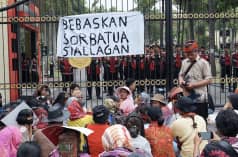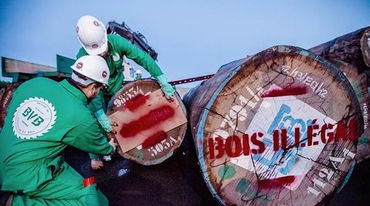Copenhagen: Get back to basics of avoiding deforestation and degradation
Aug 5, 2009
Rainforest Rescue urges all Copenhagen bound climate parties to get back to basics of avoiding deforestation and degradation as a keystone climate change response. The focus must be upon ending first time industrial logging of primary forests, while providing local peoples alternative incomes based upon fully intact standing old forests. Anything less is unworthy of green support.
Rainforest Rescue of Germany and Ecological Internet have launched a campaign leading to Copenhagen's climate talks in December to ensure carbon based funding for forest protection -- called avoided deforestation, or Reduced Emissions from Deforestation and Degradation (REDD) -- remains ecologically and socially rigorous, or does not proceed at all.
REDD has the potential to help end primary and old-growth forest logging. The REDD concept faces immediate risk of being usurped by industry. The focus in project design remains primarily upon profit-making and greenwashing "Sustainable Forest Management", rather than necessary policies to ensure large areas of primary and old-growth forests are fully protected to optimally keep existing and new carbon sequestered. It is even being suggested that first time logging of primary forests and establishment of industrial tree plantations should be worthy of carbon market financing.
"For two decades we have been working for international payments to landowners to fully protect their ancient forests. We aren't about to let a bunch of city-slicker carbon cowboys tell us logging a sixty million year old rainforest more carefully somehow helps the climate, biodiversity or local peoples," explains Dr. Glen Barry, Ecological Internet's President. The campaign seeks to highlight elements of "Good REDD" that are necessary minimum preconditions for environmentalists' support, and without which REDD should be scrapped. REDD should only pay for strict protections of primary forests and ecological restoration of natural forests to old-growth status. Good REDD includes full-informed local consent and the vast majority of benefits flowing back to local forest dependent peoples. Ideally REDD funds will come from a non-speculative source such as an aviation tax, and not from carbon market offsets that allow the rich to continue polluting. "Old Forests are key to sustaining climate, ecosystems, biodiversity, humanity and the Earth System. All of our shared survivals depends upon paying local peoples and governments to protect and restore old forests, while helping local peoples and governments benefit from them remaining standing and fully intact. Good REDD is the single most important thing that can be done to maintain a habitable Earth," notes Dr. Barry.
Those committed to ending industrial development of old forests are encouraged to follow and participate in the campaign there.
CONTACT: Reinhard Behrend, info@regenwald.org











